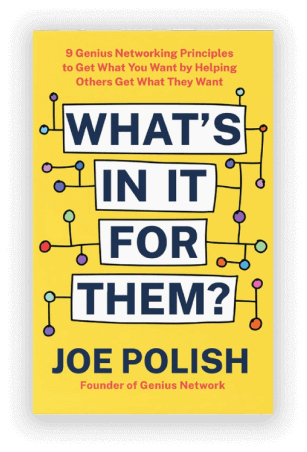Episode Summary
In this Episode, you’ll Discover the Happiness Advantage, how you can experience more joy, 5 habits for tripling your productivity, experiencing happiness above your genetic set point, and extending your life with Shawn Achor.
Shawn Achor is the New York Times bestselling author of Before Happiness and The Happiness Advantage. He spent 12 years at Harvard University and presented one of the top five most popular TEDx talks, with over 13 million views, and has become one of the world’s leading experts on the connection between happiness and success.
Recorded Live from the Genius Network Annual Event.
Here’s a glance at what you’ll learn from Shawn in this episode:
- A surprising discovery Shawn made after studying Positive Psychology for 12 years at Harvard University
- An ancient Greek definition of happiness that can help you experience more joy
- Ignorance Is Not Bliss: The difference between optimism and rational optimism
- How to become a better leader and escape “”the cult of the average””
- Success doesn’t guarantee happiness. Here are some positive changes you can make to feel happier now…
- The most important factor that predicts your long-term level of happiness
- 5 habits for tripling your productivity, experiencing happiness above your genetic set point and extending your life”
- And more!
WHAT'S IN IT FOR THEM?
Get the first chapter for FREE and a limited-time viewing of "Connected: The Joe Polish Story"
Show Notes
- Intro: Joe Polish asks the audience: How happy are you? Scale of 1-10?
- Shawn: New research in the field of Positive Psychology (2:58)
- Research is showing that we can raise your levels of happiness above your genetic setpoint and in doing so turn on the human brain to its highest possible level, raising all levels of outcome
- Research Indicates that “happiness is a choice and happiness is possible.” (3:10)
- Flaws in the research. (3:38)
- You can control variables in a lab that you can’t in real life.
- Real life testing revealed we have the happiness/success ratio backwards (04:22)
- Definition of Happiness: (4:57)
- Modern world defines happiness as pleasure, which is short lived and not worth studying(5:00)
- “The Ancient Greeks defined happiness as the joy you feel moving toward your potential.” (05:06)
- Joy is something we can feel even when life is not pleasurable. (05:25)
- We are terrified of happiness as a society, especially Entrepreneurs. (05:55)
- We think if we are happy now, we will become complacent and lose success
- Joy fuels us to see our potential, to explore, to invest deeply. (06:08)
- Harvard Business Review (06:23)
- “Let’s talk about something that’s bending the tracks of human potential.” (06:44)
- “As soon as we start talking about happiness, we think we have to be blind to the suffering we see people experiencing in this world.” (07:05)
- “Ignorance leads directly away from bliss”(07:18)
- Irrational Optimism
- “Optimism is great for a lot of things but it doesn’t stop cars from hitting us and it doesn’t stop reality from impinging upon us” (08:13)
- “If we sugar-coat the present, we make poor decisions for the future.” (08:23)
- Rational optimism
- “Rational optimism starts with realism but you maintain belief that your behavior matters if linked to the right people.” (08:38)
- Allows you to see the problems, but not to believe that they are permanent. This is what affects change (08:50)
- Study of Positive Outliers: people above the curve for some reason (09:00)
- We usually study the average. “If we keep on studying what’s average, this society, this world, will remain merely average.” (09:18)
- Instead of deleting Positive Outliers, we need to study them, not to move people toward average, but to move the entire average up. (09:35)
- Re-programming how our brain naturally works (10:00)
- Medical school syndrome: what you study becomes your reality
- “It’s not necessarily the reality that shapes us, but the lens by which we view reality.” (11:34)
- It’s not your genes or your environment that predicts your long-term level of happiness; “What predicts your long-term level of happiness are the conscious choices that you make.” (12:15)
- 5 Daily habits to create positive change:
- List 3 things you are grateful for.
- 2 minutes of journaling about a positive experience
- 15 minutes of fun, mindful cardio activity
- 2 minutes of meditation
- Write a single positive email
- Happiness Advantage:
- “We fight so hard against the negative in our society, we forget to tell people how powerful the positive can be.” (13:10)
- Do 2 minutes a day for 21 days of these positive habits and it turns out, ”we can break your genes and your environment and allow happiness to be one of the greatest competitive advantages in the modern economy.”(13:14)





